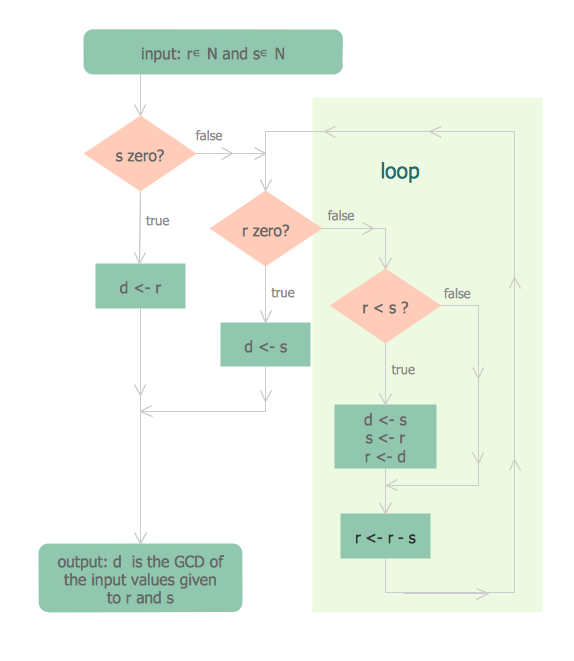"In mathematics, the Euclidean algorithm, or Euclid's algorithm, is a method for computing the greatest common divisor (GCD) of two (usually positive) integers, also known as the greatest common factor (GCF) or highest common factor (HCF). ...
The GCD of two positive integers is the largest integer that divides both of them without leaving a remainder (the GCD of two integers in general is defined in a more subtle way).
In its simplest form, Euclid's algorithm starts with a pair of positive integers, and forms a new pair that consists of the smaller number and the difference between the larger and smaller numbers. The process repeats until the numbers in the pair are equal. That number then is the greatest common divisor of the original pair of integers.
The main principle is that the GCD does not change if the smaller number is subtracted from the larger number. ... Since the larger of the two numbers is reduced, repeating this process gives successively smaller numbers, so this repetition will necessarily stop sooner or later - when the numbers are equal (if the process is attempted once more, one of the numbers will become 0)." [Euclidean algorithm. Wikipedia]
The flowchart example "Euclidean algorithm" was created using the ConceptDraw PRO diagramming and vector drawing software extended with the Mathematics solution from the Science and Education area of ConceptDraw Solution Park.
The GCD of two positive integers is the largest integer that divides both of them without leaving a remainder (the GCD of two integers in general is defined in a more subtle way).
In its simplest form, Euclid's algorithm starts with a pair of positive integers, and forms a new pair that consists of the smaller number and the difference between the larger and smaller numbers. The process repeats until the numbers in the pair are equal. That number then is the greatest common divisor of the original pair of integers.
The main principle is that the GCD does not change if the smaller number is subtracted from the larger number. ... Since the larger of the two numbers is reduced, repeating this process gives successively smaller numbers, so this repetition will necessarily stop sooner or later - when the numbers are equal (if the process is attempted once more, one of the numbers will become 0)." [Euclidean algorithm. Wikipedia]
The flowchart example "Euclidean algorithm" was created using the ConceptDraw PRO diagramming and vector drawing software extended with the Mathematics solution from the Science and Education area of ConceptDraw Solution Park.
Ordering Process Flowchart. Flowchart Examples
A flowchart is a widely used type of diagram that visually represents an algorithm, workflow or process, using the boxes of various kinds to depict the steps and connecting them with arrows to show the order of execution these steps. Еhe ConceptDraw PRO supplied with Accounting Flowcharts Solution from the Finance and Accounting Area of ConceptDraw Solution Park is a powerful diagramming and vector drawing software which ideally suits for designing Ordering Process Flowchart of any complexity.- Euclidean algorithm - Flowchart | Hcf Of 2 Numbers For Algorithm ...
- Euclidean algorithm - Flowchart | Basic Flowchart Symbols and ...
- Solving quadratic equation algorithm - Flowchart | Basic Flowchart ...
- Algorithm Flowchart Diagram
- Euclidean algorithm - Flowchart | Mathematics | Solving quadratic ...
- Solving quadratic equation algorithm - Flowchart
- Flowchart To Find GCD Of Two Number
- Gcd Of Two Integers Flow Chart
- Flow Chart Of A Factor Of Two Numbers
- Euclidean algorithm - Flowchart | Flow chart Example. Warehouse ...
- Example Of Flowchart With Algorithm
- Solving quadratic equation algorithm - Flowchart | Euclidean ...
- Euclidean algorithm - Flowchart | Examples of Flowcharts , Org ...
- Euclidean algorithm - Flowchart | Flow Chart Of Computer For Hcf ...
- Difference Between The Flowchart And Algorithm
- Euclidean algorithm - Flowchart | Flowchart For Euclid Division ...
- Basic Flowchart Symbols and Meaning | Credit Card Order Process ...
- Euclidean algorithm - Flowchart | Java Search Algorithm Flowchart
- Basic Diagramming | Types of Flowchart - Overview | Mathematics ...
- Flowchart Algorithm Examples

